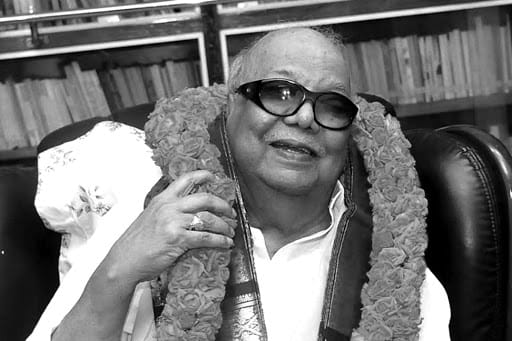Karunanidhi, also known as Kalaignar, was one of the pioneers of Dravidian politics. He was 94.
Bengaluru: Muthuvel Karunanidhi, Tamil Nadu’s five-time chief minister and a major player in the coalition landscape who courted both the Congress and the BJP in turns, passed away in Chennai Tuesday after a prolonged spell of age-related illness. He was 94.
“With deep anguish, we announce the demise of our beloved Kalaignar Dr M. Karunanidhi on 07.08.2018 at 06.10pm. Despite the best possible efforts by our team of doctors and nurses to resuscitate him, he failed to respond,” Kauvery Hospital said in a press release.
The Dravida Munnetra Kazhagam (DMK) chief was addressed by supporters as ‘Kalaignar’, or artiste, because that’s what Karunanidhi was. While still in his 20s, Karunanidhi was already writing films challenging the prevailing caste dynamics and superstitions that went on to gain cult status in Tamil pop culture.
Also read: The eternal flame of Dravidian politics is extinguished. Farewell, ‘Kalaignar’ Karunanidhi
Karunanidhi’s interest in politics began when he was 14 years old. His initial years in politics saw him emerge as an ardent campaigner for the cause of greater autonomy for states along with DMK founder C.N. Annadurai — a movement credited with making the state’s politics the regional dominion it is today with negligible space for national parties.
Even after the DMK split, with superstar M.G. Ramachandran parting ways to form the AIADMK in 1972, the space could never be grabbed by national players. Instead, as MGR established himself as a superstar on the political stage too, the DMK and the AIADMK emerged as the two primary centres of the state’s politics.
As an actor, MGR mouthed dialogues written by Karunanidhi in more than one film. As a politician, his popularity ensured Karunanidhi remained out of power until his death in 1987.
Karunanidhi first became chief minister at the age of 45 in 1969, after the death of Annadurai, with four stints in office awaiting him.
The second began in 1971, but just as it was about to complete a five-year term, his government was dismissed by the then Indira Gandhi administration during the Emergency, in 1976. It was 13 years before he returned to office for his third term, in 1989, with his fourth and fifth stints starting in 1996 and 2006, respectively.
Until her death in December 2016, MGR protégé J. Jayalalithaa was his prime rival in the state.
The other Karunanidhi
His interest and active career in politics, however, never stopped him from indulging in his first love, Tamil literature.
Karunanidhi started writing at the age of 14 for a local newspaper, around the same time he got attracted to the rationalist ideology of Periyar E.V. Ramaswamy, the founder of DMK progenitor Dravida Kazhagam.
His talent as a writer was first noticed by the owner of Modern theatre studios in Salem, T.R. Sundaram, who later also played a critical role in the launch of MGR and Jayalalithaa as actors. Recognition as a scriptwriter followed, but Karunanidhi did not confine himself to writing plays and movies.
After the DMK was formed in 1949, his oratory helped Karunanidhi draw huge crowds. The movies he wrote, as well as the dialogues, were inspired by the ideology of the Dravidian movement – as evidenced in the 1952 classic Parasakthi — with stalwarts like Sivaji Ganesan bringing it alive on screen.
Two movies in particular from the era – Panam and Thanga Rathnam — shook Tamil society with their take on widow remarriage, untouchability, self-respect in marriage, and the abolition of the zamindari system. A similar refrain ran through his books, namely Kuraloviyam, Sanga Thamizh, Thirukkural Urai, and Ponnar Sankar, among others.
Also read: Karunanidhi ensured DMK representation at Centre & in state like no other regional leader
Amid reports of his deteriorating health, hundreds of his supporters assembled outside the hospital Karunanidhi is in with chants of “Long live, long live, Kalaignar”,’ and “Get up and come away, Kalaignar”.
Kalaignar was a title Annadurai gave Karunanidhi because of his literary leanings. Coupled with his masterly political skills, Kalaignar he stays to date.






